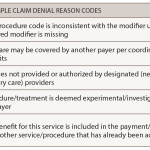Submitting a clean Medicare reimbursement claim the first time can save your practice thousands of dollars each year. The Centers for Medicare and Medicaid Services (CMS) defines a clean claim as “a submitted patient claim form without any defect or need for substantiation.”
Whether a clean claim is submitted on paper or electronically, it must be submitted on a CMS-1500 form. The CMS-1500 form has 33 different boxes that need to be filled in with details such as:
- Insurance information;
- Referring physician information;
- Service information; and
- Submitting physician information.
Missing any of these areas can cause claims to be rejected, which will quickly impact your accounts receivable.
Currently, many states have prompt payment regulations. For example, Iowa has a prompt payment regulation stating that health insurers must either pay or deny claims within 30 days of receiving the claim. The insurer is required by law to automatically pay interest of 10% per year, but the original claim must be clean. (CMS and self-funded plans are exempt from state prompt payment regulations.)
It is important for you to have third-party payers verify their definition of a clean claim as well as their turnaround time for reimbursement. You also have the autonomy to negotiate penalty payments from third-party payers if claims are not processed within the negotiated time frame.
By ensuring only clean claims go out the door, and by holding payers accountable if claims are not paid within the allowed time, physicians can save money and valuable staff time.
For more information on claims processing procedures, contact Melesia Tillman, CPC, at [email protected] or (404) 633-3777 ext. 820.

